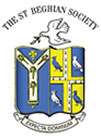|
 |
The Old St Beghian | |
| July 2014 | |||
ST BEES FESTIVAL OF MUSIC1958-1964
The final St Bees Festival of Music came to an end on 5th April, 1964. After half a century it is worth remembering a remarkable, though short-lived, chapter in the life of the school. I hope that this reminiscence may interest those who have passed through St Bees more recently and know nothing of the concerts; and also rekindle the memories of those who were there.
The inspiration came from the 1957 school play – a production of Ruddigore, in which the school’s choir and soloists were supported by an orchestra drawn mostly from former members of the National Youth Orchestra and Cambridge undergraduates, under the conductorship of Donald Leggat, the school’s Director of Music. The production was a resounding success, and on the Sunday afternoon following the last night, the orchestra members themselves organised an informal concert for the school to hear.
Encouraged and inspired, the Headmaster, James Wykes, a keen musician himself, and Donald Leggat, as chief conductor and Artistic Director, gathered together a committee as well as an impressive body of public figures as patrons to work towards establishing a two-day Festival in the following year, which would bring high-quality orchestral, choral and chamber music to a part of the country which was largely starved of professional music-making. There were to be three musical events in each day: a chamber concert/recital in the afternoon, choral Evensong sung by the school choir in the Priory Church and an evening choral and orchestral concert. To avoid disrupting the school’s normal academic and sporting routines, the Festival was to be held on the Friday and Saturday following the end of the Lent Term, the choir remaining in residence and, with the orchestra, moving into Foundation.
Thus a pattern for future Festivals was established, with the later addition of a concert on the following Sunday. In order to widen the potential audience, the 1959 Festival was held in Keswick; in most subsequent years, while the Festival remained based in St Bees, at least one major event was held elsewhere in the county: Carlisle Cathedral in 1961 and 1963; Millom in 1962 and Whitehaven in 1964.
The sheer enterprise and quality of the Festivals began to attract national attention: several newspapers sent their music critics, and numerous leading soloists visited to give often memorable performances. The policy of commissioning new music involved several significant composers, some young and up-and-coming, such as David Barlow, Edwin Roxburgh, and Martin Dalby, and well-established figures, among them Gordon Jacob and the then Professor of Music at Cambridge, Patrick Hadley: the former wrote his suite on English Folksongs Old Wine in New Bottles for the 1959 Festival, while the latter’s Cantata: Lenten Meditations (1963) has subsequently received at least two different commercial recordings on CD. Professor Hadley took a close interest in the Festival from an early stage, appearing first at Keswick in 1959, subsequently becoming a Patron and a close personal friend of Donald Leggat.
In addition to new works, the programmes reflected the whole range of five centuries of European music: they included familiar popular classics (e.g. Fauré: Requiem; Rachmaninov: 2nd Piano Concerto; Elgar: Cello Concerto; Schubert: ‘Unfinished’ Symphony; Sullivan: selections from The Gondoliers) and also neglected masterpieces and out-of-the-way works (Ernst Bloch: Concerto Grosso; Delius: scenes from Hassan; Lambert: The Rio Grande), old English music, a particular enthusiasm of Donald Leggat, (works by Garth, Boyce, Arne and Purcell, whose tercentenary was celebrated in 1959) and major works by established contemporary composers (e.g. Britten and Stravinsky). The choral music performed by the Choir in services and concerts ranged from the 16th to the 20th century.
No brief summary of the Festival’s history can adequately describe the sense of adventure and enterprise that it engendered, particularly for those of us who were fortunate enough to be at the school and in the choir during this golden era. As an Old St Beghian myself after 1960, it became essential, even compulsive, to return for subsequent Festivals and to take part as an undergraduate performer. And among the young orchestral players who visited, some of them several years in succession, there were many who went on to considerable distinction in various musical fields and who remember with affection and gratitude the experience of St Bees Festivals; among them is an Emeritus Professor of Music in an American University, who recounted to me in recent years his happy memories of St Bees Festivals.
Of course it could not go on for ever; it depended on the enthusiasm of a few people who inevitably moved on, and it was no doubt a drain on the resources of the school. But while it lasted it was a glimpse of heaven – full of revelatory experiences, sheer enjoyment and enduring memories. Those of us from within the school community who benefited from it and were enriched by it remain forever indebted to those whose vision inspired and created it.
Michael Frith (SH 55-60)
Home
The St Beghian Society
St Bees School,
St Bees, Cumbria, CA27 0DS.
Tel: (01946) 828093 Email: osb@st-bees-school.co.uk
Web: www.st-beghian-society.co.uk